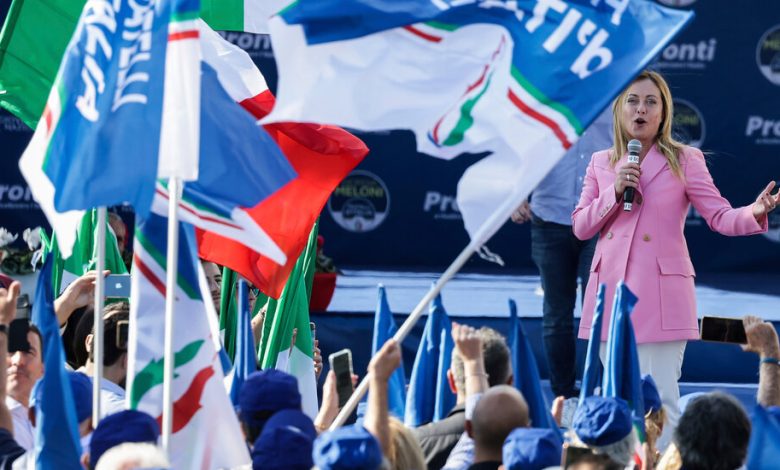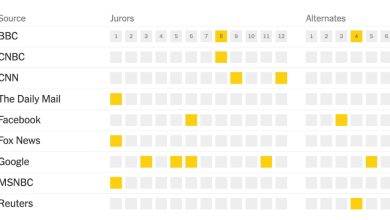Giorgia Meloni Leads Voting in Italy, in Breakthrough for Europe’s Hard Right

ROME — Italy appeared to turn a page of European history on Sunday by electing a hard-right coalition led by Giorgia Meloni, whose long record of bashing the European Union, international bankers and migrants has sown concern about the nation’s reliability in the Western alliance.
Early projections based on a narrow sampling of precincts, as well as exit polls, on Sunday night suggested that Ms. Meloni, the leader of the nationalist Brothers of Italy, a party descended from the remnants of fascism, had led a right-wing coalition to a majority in Parliament, defeating a fractured left and a resurgent anti-establishment movement.
The final results would not be clear until Monday, and it will still be weeks before the new Italian parliament is seated and a new government is formed, leaving plenty of time for political machinations. But Ms. Meloni’s strong showing, with about 25 percent of the vote, the highest of any single party, makes her the prohibitive favorite to become the country’s first female prime minister.
While she is a strong supporter of Ukraine, her coalition partners deeply admire Russia’s president, Vladimir V. Putin, and have criticized sanctions against Russia.
“From the Italians has arrived a clear indication,” Ms. Meloni, known for her crescendoing rhetoric and cult of personality, said in a measured victory speech at nearly 3 a.m., “for the center-right to guide Italy.”
After saying she had suffered through a “violent electoral campaign” filled with unfair attacks, Ms. Meloni spoke about “reciprocal respect” and recreating “trust in the institutions.” She posed flashing a victory sign. “We are at the starting point,” she said, adding, “Italy chose us, and we will never betray it.”
The victory, in an election with lower turnout than usual, comes as formerly taboo and marginalized parties with Nazi or fascist heritages are entering the mainstream — and winning elections — across Europe.
This month, a hard-right group founded by neo-Nazis and skinheads became the largest party in Sweden’s likely governing coalition. In France this year, the far-right leader Marine Le Pen — for a second consecutive time — reached the final round of presidential elections. In Spain, the hard-right Vox, a party closely aligned with Ms. Meloni, is surging.
But it is Italy, the birthplace of fascism and a founding member of the European Union, that has sent the strongest shock wave across the continent after a period of European-centric stability led by Prime Minister Mario Draghi, who directed hundreds of billions of euros in recovery funds to modernize Italy and helped lead Europe’s strong response to Russia.
“This is a sad day for the country,” Debora Serracchiani, a leader of the Democratic Party, which will now lead the opposition, said in a statement early Monday morning.
Ms. Meloni’s victory showed that the allure of nationalism — of which she is a strong advocate — remained undimmed, despite the breakthroughs by E.U. nations in coming together to pool sovereignty and resources in recent years, first to combat the coronavirus pandemic and then Mr. Putin’s initiation of the largest conflict in Europe since World War II.
How, and how deeply, a right-wing coalition in Italy led by Ms. Meloni could threaten that cohesion is now the foremost concern of the European establishment.
Ms. Meloni has staunchly, and consistently, supported Ukraine and its right to defend itself against Russian aggression. But her coalition partners — Matteo Salvini, the firebrand leader of the League, and the former prime minister Silvio Berlusconi — have clearly aligned themselves with Mr. Putin, questioning sanctions and echoing his propaganda.
That fracture, and the bitter competition between the right-wing leaders, could prove fatal for the coalition, leading to a short-lived government. But some political analysts say Ms. Meloni, having attained power, may be tempted to soften her support for sanctions, which are unpopular in much of Italy.
If she does, there is concern that Italy could be the weak link that breaks the European Union’s strong united position against Russia.
Ms. Meloni had spent the campaign seeking to reassure an international audience that her support of Ukraine was unwavering. She sought to allay concerns by condemning Mussolini, whom she once admired, and Italy’s Fascist past. She also made more supportive noises about Italy’s place in the European Union and distanced herself from Ms. Le Pen and Prime Minister Viktor Orban of Hungary, whom she had previously emulated.
But that pivoting was more for international markets than Italian voters, who didn’t much care about her past, or even her affinity for illiberal democracies. The Italian electorate had not moved to the right, political scientists said, but instead again resorted to a perennial desire for a new leader who could possibly, and providentially, solve all its ills.
Ms. Meloni found herself in the right place at the right time. Hers was virtually the only major party to remain outside Mr. Draghi’s national unity government, allowing her to soak up an increasing share of the opposition. Her support surged from 4 percent to nearly about 25 percent.
After a revolt by a party in Mr. Draghi’s broad unity government in July, the right-wing parties, eager to go to elections they were favored to win, sensed opportunity and bolted, with Ms. Meloni in the pole position.
There is little concern in the Italian establishment that she will undermine Italian democracy — she has been a consistent advocate for elections during unelected technocratic governments and has long served in Parliament.
There is also a widespread belief that Italy’s dependence on hundreds of billions of euros in relief funds from the European Union will force Ms. Meloni and her government to follow the spending plans, reforms and overall blueprint established by Mr. Draghi. The money comes in tranches and the plans have to meet strict criteria. If she reverses course, Italy could lose out on billions of essentially free euros as rising energy prices and inflation — much of it stemming from the sanctions against Russia — are expected to worsen in coming months.
But there is concern about Ms. Meloni’s lack of experience and her party’s lack of technical expertise, especially in running the eurozone’s third-largest economy,and Mr. Draghi has kept in close touch with her, both to ensure her support for Ukraine and, insiders say, to help find someone who can provide economic continuity.
Nevertheless, Ms. Meloni represents a historic break at the top of Italian government.
She came of political age in a post-Fascist, hard right that sought to redefine itself by seizing on new symbols and texts, especially “The Lord of the Rings” and other works by the British writer J.R.R. Tolkien, to distance itself from the taboos of Fascism.
She grew up with a single mother in a working-class area of Rome, and being a woman, and mother, has been central to her political identity. She once ran for mayor while pregnant because she said powerful men had told her she couldn’t. Her most famous speech includes the refrain “I am a woman. I am a mother.”
Being a woman has also distinguished her, and marked a major shift, from her coalition partners, especially Mr. Berlusconi, the subject of endless sex scandals.
But Ms. Meloni, Mr. Berlusconi and Mr. Salvini share a hard-right vision for the country. Ms. Meloni has called for a naval blockade against migrants and spread fears about a “great replacement” of native Italians. The three share populist proposals for deep tax cuts that economists fear would inflate Italy’s already enormous debt, and a traditionalist view of the family that liberals worry will at least freeze in place gay rights and which could, in practice, roll back abortion rights.
Despite the constraints of an Italian Constitution that is explicitly anti-Fascist and designed to stymie the rise of another Mussolini, many liberals are now worried that the right-wing coalition will erode the country’s norms. There was concern that if the coalition were to win two-thirds of the seats in Parliament, it would have the ability to change the Constitution to increase government powers.
On Thursday, during one of Ms. Meloni’s final rallies before the election, she exclaimed that “if the Italians give us the numbers to do it, we will.”
But the coalition appeared not to hit that mark.
The main party of the left, the Democratic Party, all but guaranteed its defeat by failing to heal its differences with other liberal and centrist parties, including a new group of moderates. The moderates, backed by former Prime Minister Matteo Renzi, and attracting some former leaders of Mr. Berlusconi’s party, who were disillusioned with his following of the hard right, did better than expected, but still seemed to remain in the single digits.
What really held the right back from a landslide were their former governing partners, the Five Star Movement, the once anti-establishment movement that triggered the collapse of Mr. Draghi’s government when it revolted in July.
In 2018, the party’s burn-down-the-elite rhetoric led it to become the country’s most popular party and largest force in Parliament. Years of governing — first with the hard-right Mr. Salvini, and then with the Democratic Party, and then under Mr. Draghi — exposed its incompetence and infighting and it imploded. It seemed on the brink of extinction. But during the campaign, led by former Prime Minister Giuseppe Conte, the party surged in the country’s underserved south.
That development was mainly because Five Star passed a broad unemployment benefit known as the “citizen’s income,” which though roundly criticized by moderates and the right as a handout to the lazy and a disincentive to work, has become a cherished benefit.
As a result, Five Star appeared to be becoming the party of the south.
“This is what is emerging,” said Angelo Tofalo, himself a southerner and a leader in the party, as he cheered Mr. Conte, at a rally in Rome on Friday. He said the party had laid down deep roots in the south, but acknowledged, “the citizen’s income is a factor.”
That unexpected strength ate into Ms. Meloni’s support, while she devoured the backing of the League party of Mr. Salvini. Only years ago he was the country’s most popular populist. Now he appeared to sink to single digits. Mr. Berlusconi, once the hinge upon which the coalition turned, and who legitimized the marginalized post-Fascists and secessionist League in the 1990s, also registered a modest result.
But together they had enough to govern and Ms. Meloni had the clearest claim on the office of prime minister during negotiations and consultations with Italy’s president, Sergio Mattarella, which will take place over the next month. The new government is likely to be seated in late October or early November.
But the message of the end of a period of European taboos, and of new change, has already been sent.
Ms. Meloni said in one of her last interviews before the election that her victory would be “a redemption” for all the people who “for decades had to keep their heads down” and who had an “alternative vision from the mainstream of the system of power.”
Elisabetta Povoledo in Rome, Gaia Pianigiani in Florence and Emma Bubola in Verona contributed reporting.




